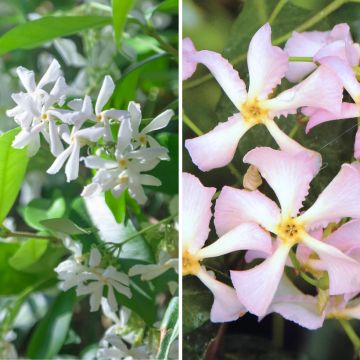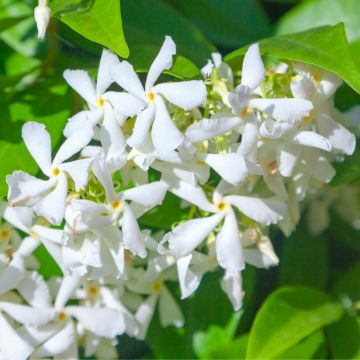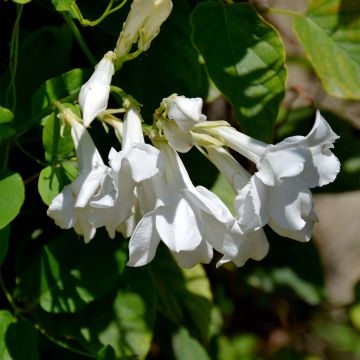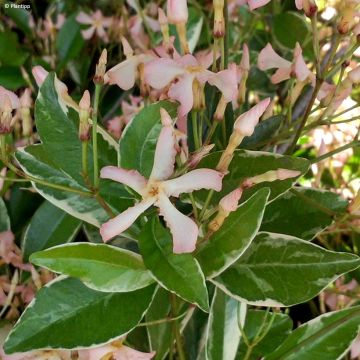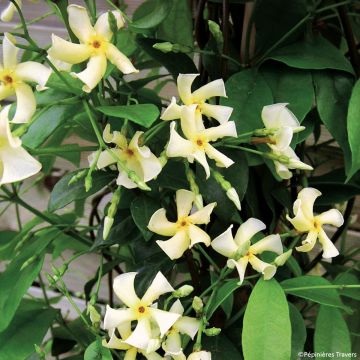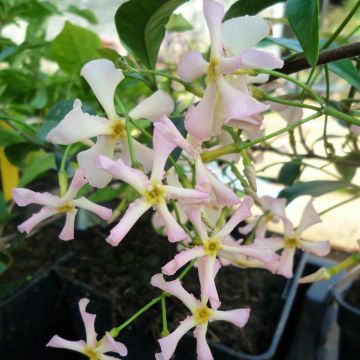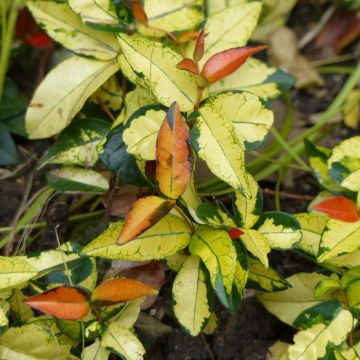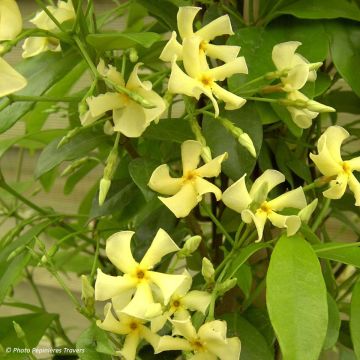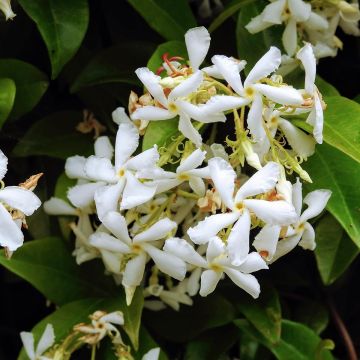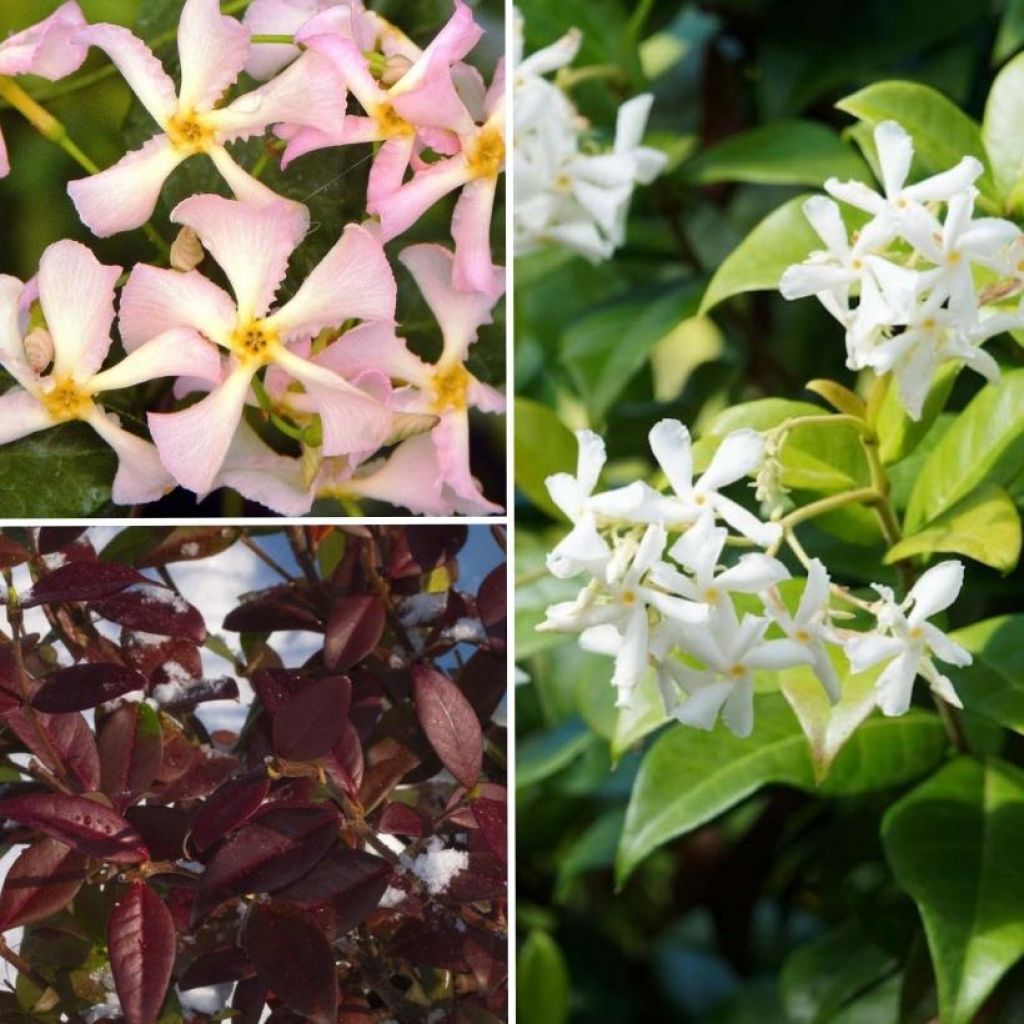

Collection 3 jasmins à petit prix
Collection of 3 scented star jasmines
Trachelospermum jasminoides, asiaticum
Star Jasmine, Confederate Jasmine, Trader's Compass
PACKAGE WELL PACKAGED! THE JASMINES ARE PLANTED AND WAITING TO BLOOM THIS SPRING! I'M VERY HAPPY! THANK YOU
GHISLAINE (ARIEGE), 29/10/2025
Special offer!
Receive a €20 voucher for any order over €90 (excluding delivery costs, credit notes, and plastic-free options)!
1- Add your favorite plants to your cart.
2- Once you have reached €90, confirm your order (you can even choose the delivery date!).
3- As soon as your order is shipped, you will receive an email containing your voucher code, valid for 3 months (90 days).
Your voucher is unique and can only be used once, for any order with a minimum value of €20, excluding delivery costs.
Can be combined with other current offers, non-divisible and non-refundable.
Home or relay delivery (depending on size and destination)
Schedule delivery date,
and select date in basket
This plant carries a 6 months recovery warranty
More information
We guarantee the quality of our plants for a full growing cycle, and will replace at our expense any plant that fails to recover under normal climatic and planting conditions.

Would this plant suit my garden?
Set up your Plantfit profile →
Description
This Collection of 3 Star Jasmines at a very sweet price brings together three varieties of Tachelospermum, commonly known as False Jasmines, appreciated for their deliciously scented flowering, their year-round decorative foliage, green to red in winter, as well as their ease of cultivation in open ground in regions that are not too cold. Their flowering, in small white or pink stars, takes place between June and July. These climbing plants, although vigorous, can also be grown in pots, which allows them to be protected from severe frost in less favourable climates. They allow everyone to indulge themselves while controlling their budget!
This collection consists of:
1 x Trachelospermum jasminoides: this is the typical species, vigorous, with white flowers, capable of occupying 8 m in all directions in open ground, depending on the growing conditions. Its small flowers exude a penetrating fragrance that is both spicy and sweet, and its glossy, leathery foliage sometimes takes on beautiful orange-red hues.
1 x Trachelospermum jasminoides Winter Ruby 'Trared': a selection whose foliage will turn red under the effect of cold. Its flowering and dimensions are identical to the previous species.
1 x Trachelospermum asiaticum 'Pink Showers': this one offers pink flowers instead of cream or white, and they diffuse the same extraordinary biscuit-like fragrance that we appreciate throughout the summer in the typical species. Slightly less vigorous than the previous two, it still climbs up to 5 m.
The star jasmine is a climbing or creeping plant of the apocynaceae family, it is a cousin of periwinkles, as well as of Alamanda and Mandevilla (Dipladenia, the summer glory of our flowering pots). Its origins are found in China, Japan, Korea, and Vietnam. It takes a little while to establish, and the plant develops long stems that quickly turn woody. The branches are adorned with opposite, entire, ovate leaves with pointed tips. They are thick, leathery, and glossy. The twining branches, when encountering a moist surface, emit aerial roots that allow the plant to cling to walls, the ground, or stones, similar to ivy. This plant is capable of withstanding -12 to -15 °C at its peak once mature and well-rooted, in a sheltered location.
The star jasmine also grows very well in a large pot to elegantly adorn the terrace or balcony. Further south, it can be planted in open ground, in sun or shade, where it will show resistance to summer drought once well established. It is most often used to climb walls or fences, but it can also make an excellent ground cover, even in the shade of deciduous trees, as an alternative to ivy. Perfect for filling out a hedge between evergreens or hiding an unpleasant view, Trachelospermum can also form a beautiful permanent "tunnel," a passage between two areas of the garden; it can be trained on a structure made with two arches joined by wires. It can also adorn the edge of steps, crown the slope of a hollow path... At its base, Mexican orange trees, shrubby lavateras and a creeping ceanothus... will find their place. Its branches will mingle with those of clematis, honeysuckles, or climbing Solanum in mild climates.
Report an error about the product description
Plant habit
Flowering
Foliage
Botanical data
Trachelospermum
jasminoides, asiaticum
Apocynaceae
Star Jasmine, Confederate Jasmine, Trader's Compass
Cultivar or hybrid
Other Star Jasmine - Trachelospermum
View all →Planting and care
Plant the Trachelospermum in spring in the north, September-October in the south. Choose a sunny or semi-shaded exposure, or even shade where it will be slightly less floriferous. Plant it in deep, loose and healthy, well-drained soil, sheltered from cold winds. It can tolerate -10°C, even spikes down to -15°C, but will better withstand severe frosts if the foliage is protected with a winter cover and the soil is dry.
This plant tolerates limestone well, provided there is no excess moisture in winter; in very clayey and suffocating soil, it may show symptoms of chlorosis (gradually yellowing leaves starting from the periphery, with the veins remaining green). Water in summer or in case of drought during the first two years, to help the plant establish itself. Once the roots have penetrated deep enough into the soil, it will manage on its own, even in very dry summers. In autumn, a slow-release organic fertiliser can be applied and lightly raked in at the base of the plant, starting from the second year.
You can prune it in late winter to control its growth, or after each flowering wave.
Planting period
Intended location
Care
-
, onOrder confirmed
Reply from on Promesse de fleurs
Haven't found what you were looking for?
Hardiness is the lowest winter temperature a plant can endure without suffering serious damage or even dying. However, hardiness is affected by location (a sheltered area, such as a patio), protection (winter cover) and soil type (hardiness is improved by well-drained soil).

Photo Sharing Terms & Conditions
In order to encourage gardeners to interact and share their experiences, Promesse de fleurs offers various media enabling content to be uploaded onto its Site - in particular via the ‘Photo sharing’ module.
The User agrees to refrain from:
- Posting any content that is illegal, prejudicial, insulting, racist, inciteful to hatred, revisionist, contrary to public decency, that infringes on privacy or on the privacy rights of third parties, in particular the publicity rights of persons and goods, intellectual property rights, or the right to privacy.
- Submitting content on behalf of a third party;
- Impersonate the identity of a third party and/or publish any personal information about a third party;
In general, the User undertakes to refrain from any unethical behaviour.
All Content (in particular text, comments, files, images, photos, videos, creative works, etc.), which may be subject to property or intellectual property rights, image or other private rights, shall remain the property of the User, subject to the limited rights granted by the terms of the licence granted by Promesse de fleurs as stated below. Users are at liberty to publish or not to publish such Content on the Site, notably via the ‘Photo Sharing’ facility, and accept that this Content shall be made public and freely accessible, notably on the Internet.
Users further acknowledge, undertake to have ,and guarantee that they hold all necessary rights and permissions to publish such material on the Site, in particular with regard to the legislation in force pertaining to any privacy, property, intellectual property, image, or contractual rights, or rights of any other nature. By publishing such Content on the Site, Users acknowledge accepting full liability as publishers of the Content within the meaning of the law, and grant Promesse de fleurs, free of charge, an inclusive, worldwide licence for the said Content for the entire duration of its publication, including all reproduction, representation, up/downloading, displaying, performing, transmission, and storage rights.
Users also grant permission for their name to be linked to the Content and accept that this link may not always be made available.
By engaging in posting material, Users consent to their Content becoming automatically accessible on the Internet, in particular on other sites and/or blogs and/or web pages of the Promesse de fleurs site, including in particular social pages and the Promesse de fleurs catalogue.
Users may secure the removal of entrusted content free of charge by issuing a simple request via our contact form.
The flowering period indicated on our website applies to countries and regions located in USDA zone 8 (France, the United Kingdom, Ireland, the Netherlands, etc.)
It will vary according to where you live:
- In zones 9 to 10 (Italy, Spain, Greece, etc.), flowering will occur about 2 to 4 weeks earlier.
- In zones 6 to 7 (Germany, Poland, Slovenia, and lower mountainous regions), flowering will be delayed by 2 to 3 weeks.
- In zone 5 (Central Europe, Scandinavia), blooming will be delayed by 3 to 5 weeks.
In temperate climates, pruning of spring-flowering shrubs (forsythia, spireas, etc.) should be done just after flowering.
Pruning of summer-flowering shrubs (Indian Lilac, Perovskia, etc.) can be done in winter or spring.
In cold regions as well as with frost-sensitive plants, avoid pruning too early when severe frosts may still occur.
The planting period indicated on our website applies to countries and regions located in USDA zone 8 (France, United Kingdom, Ireland, Netherlands).
It will vary according to where you live:
- In Mediterranean zones (Marseille, Madrid, Milan, etc.), autumn and winter are the best planting periods.
- In continental zones (Strasbourg, Munich, Vienna, etc.), delay planting by 2 to 3 weeks in spring and bring it forward by 2 to 4 weeks in autumn.
- In mountainous regions (the Alps, Pyrenees, Carpathians, etc.), it is best to plant in late spring (May-June) or late summer (August-September).
The harvesting period indicated on our website applies to countries and regions in USDA zone 8 (France, England, Ireland, the Netherlands).
In colder areas (Scandinavia, Poland, Austria...) fruit and vegetable harvests are likely to be delayed by 3-4 weeks.
In warmer areas (Italy, Spain, Greece, etc.), harvesting will probably take place earlier, depending on weather conditions.
The sowing periods indicated on our website apply to countries and regions within USDA Zone 8 (France, UK, Ireland, Netherlands).
In colder areas (Scandinavia, Poland, Austria...), delay any outdoor sowing by 3-4 weeks, or sow under glass.
In warmer climes (Italy, Spain, Greece, etc.), bring outdoor sowing forward by a few weeks.






























